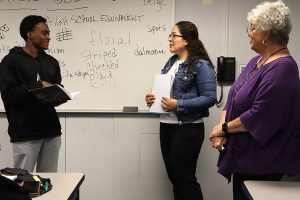Academic Restrictions
Students are placed on restriction(s) for a variety of reasons related to academic performance: lack of adhering to the College Standards of Academic Progress (SOAP) or not having high school or college transcripts on file. Some restrictions may limit the number of credit hours students may register for or may actually prevent, in some cases, students from completing the registration process. Students who have been placed on academic warning, probation or dismissal status may find their registration restricted. For further information regarding SOAP restrictions, contact the Counseling Center. For information on transcript restrictions, contact the Admissions Center.
Standards of Academic Progress (SOAP)
I. Academic Warning
Any student whose cumulative grade point average falls below a 2.0 as measured at the end of the spring semester will be placed on Academic Warning. While on Academic Warning a student will be required to meet with a counselor before registering. The student must attain a 2.0 grade point average for credit hours taken while on warning. A student is removed from Academic Warning when the cumulative grade point average is at least a 2.0.
II. Academic Probation
While on Academic Warning, any student who attempts one or more college-credit courses and fails to achieve at least a 2.00 grade point average for the semester will be placed on Academic Probation. At this time, the student will be required to meet with a counselor to review his/her academic status before registration is permitted. A student is removed from ACADEMIC PROBATION when the cumulative grade point average is at least 2.00
III. Special Probation and Academic Dismissal
While on Academic Probation, any student who attempts one or more college-credit courses and fails to achieve at least a 2.00 grade point average for the semester will be placed on Academic Dismissal.
- Special Probation – A student may apply for Special Probation status provided the student completes an Application for Readmission and meets with a counselor. Readmission is subject to Counselor approval. If a student is readmitted, he/she is placed on Special Probation and will be required to attain at least a 2.00 grade point average per semester for credit hours taken while on Special Probation. A student is removed from Special Probation when the cumulative grade point average is 2.00.
- Dismissal – If a student fails to achieve at least a 2.00 grade point average for the semester after being placed on Special Probation, the student will be dismissed. After a 16-week semester absence, the student may complete an Application for Readmission and meet with a Counselor. Readmission is subject to counselor approval. If readmitted, the student will be placed on Special Probation.
If a student fails to achieve at least a 2.00 grade point average for the semester after being placed on Special Probation, the student will be dismissed. After a 16-week semester absence, the student may complete an Application for Readmission and meet with a Counselor. Readmission is subject to counselor approval. If readmitted, the student will be placed on Special Probation.
NOTE: Students receiving financial aid must also meet the College’s Satisfactory Academic Progress Policy to maintain their financial aid. For more information on Financial Aid.
Academic Forgiveness
Students who have left South Suburban College with less than a 2.0 grade point average (GPA) may return and request Academic Forgiveness for prior courses in which a grade of “D” or “F” was issued. Students may apply for forgiveness any time prior to the completion of twelve (12) credit hours upon re-entry. The grade point average will be calculated using any previous courses completed with a “C or better” as well as any new courses completed.
Academic Forgiveness will be granted provided that:
- Two years have elapsed since the student last attended South Suburban College.
- All grades issued prior to “academic forgiveness” will remain on the transcript. All attempted hours will remain in the calculated total, and may influence a student’s eligibility for financial aid.
- A forgiven course will not count towards graduation or program requirements.
- A student may use the academic forgiveness policy only one time. Once approved to re-enter under the academic forgiveness policy, a student may not reapply for forgiveness regardless of the outcome.
- A designation that the student re-entered the institution under the academic forgiveness policy will appear on the official transcript. An explanation of the policy will accompany official transcripts sent to other institutions.
- Students who re-enter under academic forgiveness must follow and adhere to the terms of the catalog for the year of re-entry, including all academic requirements and policies.
- Students who re-enter under academic forgiveness will have grades of “D and F” removed from the calculated GPA if they achieve a “C or better” in each course during the first 12 semester hours completed upon re-entry. If the student fails to achieve a “C or better” in each course, all grades will be used to calculate the GPA and the student forfeits the academic forgiveness and cannot reapply.
Financial aid eligibility is determined by the Standards of Academic Progress policy for financial aid recipients. If a student is granted academic forgiveness, eligibility for financial aid is not guaranteed.




